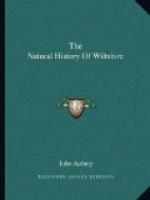[I have been favoured with a confirmation of this
note of Evelyn from the personal experience of my
old friend. Mr. Brayley, who was present at a
party on Ludgate Hill, London, many years ago, when
Mr. Broadhurst, the famed public vocalist, by singing
a high note, caused a wine glass on the table to break,
the bowl being separated from the stem.-J. B.]
___________________________________
After the echos I would have the draught of the house of John Hall, at Bradford, Esq., which is the best built house for the quality of a gentleman in Wilts. It was of the best architecture that was commonly used in King James the First’s raigne. It is built all of freestone, full of windowes, hath two wings: the top of the house adorned with railes and baristers. There are two if not three elevations or ascents to it: the uppermost is adorned with terrasses, on which are railes and baristers of freestone. It faceth the river Avon, which lies south of it, about two furlongs distant: on the north side is a high hill. Now, a priori, I doe conclude that if one were on the south side of the river opposite to this elegant house, that there must of necessity be a good echo returned from the house; and probably if one stand east or west from the house at a due distance, the wings will afford a double echo.
[Part of this once fine and interesting mansion still remains, but wofully degraded and mutilated. It is called Kingston House, having been formerly the residence of a Duke of Kingston. It appears to have been built by the same architect as the mansion of Longleat, which was erected between the years 1567 and 1579, and for which, it is believed, John of Padua was employed to make designs.-J. B.]
CHAPTER II SPRINGS MEDICINALL.
[In Aubrey’s time the mineral waters of Bath, Tonbridge, and other places, were very extensively resorted to for medical purposes, and great importance was attached to them in a sanatory point of view. The extracts which have been selected from this chapter sufficiently shew the limited extent of the author’s chemical knowledge, in the analysis of waters; which he appears to have seldom carried beyond precipitation or evaporation. He mentions several other springs in Wiltshire and elsewhere, attributing various healing properties to some of them; but of others merely observing, with great simplicity, whether or not their water was adapted to wash linen, boil pease, or affect the fermentation of beer. The chapter comprises a few remarks on droughts; and particularly mentions a remarkable cure of cancer by an “emplaster” or “cataplasme” of a kind of unctuous earth found in Bradon forest.- J. B.]




